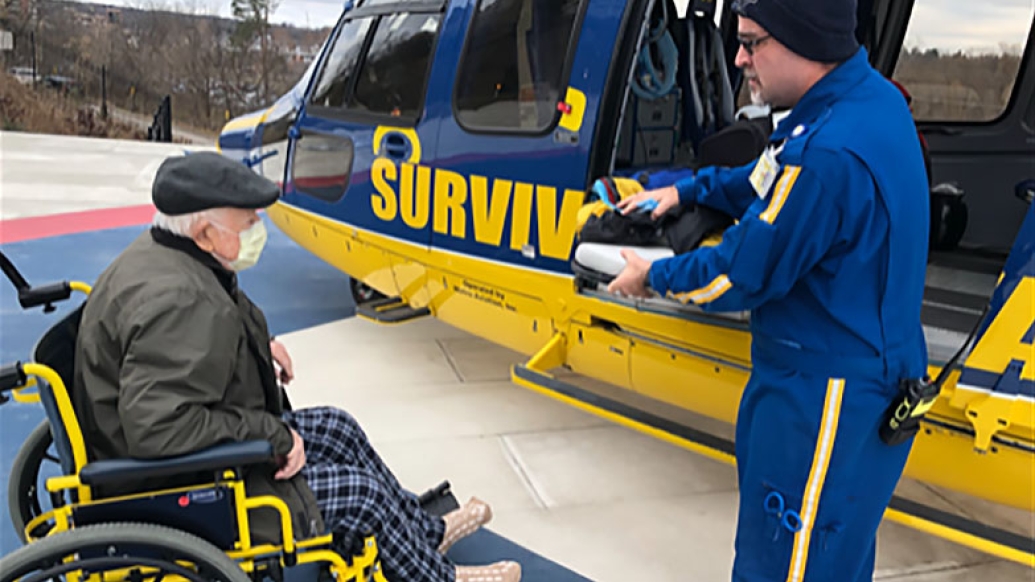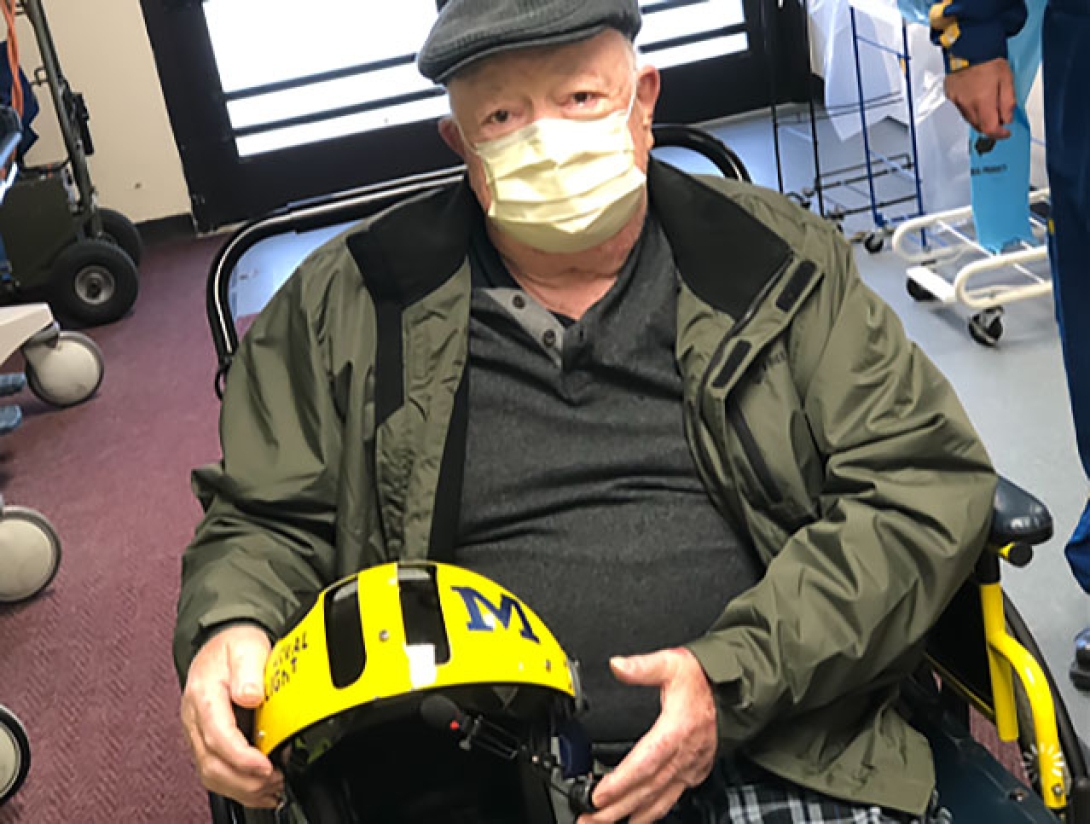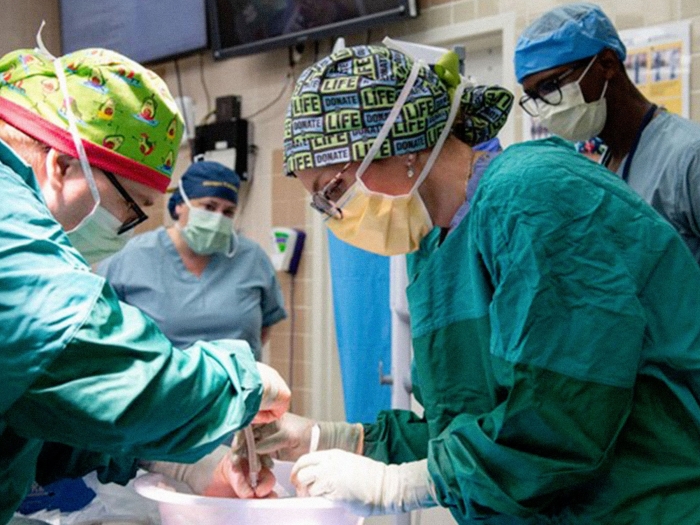While staying at University Hospital, one patient looked out his window to see the maize and blue helicopter taking off. Little did he know, he would soon meet the team.
12:07 PM
Author |

The eighth floor of a hospital might not stand out as a special place.
But for Ray Lemon, recently diagnosed with acute myeloid leukemia, it turned out to be just the place to form a budding friendship.
LISTEN UP: Add the new Michigan Medicine News Break to your Alexa-enabled device, or subscribe to our daily audio updates on iTunes, Google Play and Stitcher.
As the 80-year-old looked out his hospital window, a huge smile formed across his face – his room overlooked one of the helipads for Michigan Medicine's Survival Flight.
Survival Flight, the critical care transport program, provides rapid and safe transport of critically ill and injured patients. The program includes three rotor-wing aircrafts and a fixed-wing aircraft used to transport patients, as well as provide organ procurement services.
"I've always wanted to be a pilot," Lemon said. "My friends and I had enlisted in the Air Force and I tried to become a pilot, but I bombed the test."
Flickering lights
During the first day of his stay at University Hospital, Lemon saw one of the Survival Flight helicopters fly by his window.
"Dad was in awe of how perfectly they landed and how they looked when they exited the helicopter," said Missy Vincent, Ray's daughter. "He talked for hours about how sharp they were dressed and how they carried their helmets with such pride when they walked."
Vincent explained, "Later that evening the crew was dispatched, and Dad heard the blades begin to spin. It was everything he could do to try to get out of his bed and get close to the window so he could wave to them as they lifted off. Just as they flew by his window, my Dad swears that they flickered the lights inside the helicopter to show him that they saw him waving to them."
MORE FROM MICHIGAN: Sign up for our weekly newsletter
Vincent said Lemon smiled the rest of the night and was telling his nursing staff and doctors how cool the moment was to him.
"He repeatedly mentioned that it would be at the top of his bucket list to meet the crew," she added.
After hearing this, Lemon's patient care tech, Ellie Wahl, and registered nurse, Paula Wall, sprang into action trying to check an item off of his bucket list.
Visitors and a tour
By noon, Survival Flight nurse, Lori Jacobs, R.N., came to visit Lemon.
"Many think we only visit patients we transport," Jacobs said. "But that's not true. We'll visit anyone that wants to talk to us."
Lemon's excitement, happiness and warm smile immediately drew her in for a hug, Jacobs said.
"She was dressed in full uniform bearing a bag of gifts for Dad," Vincent said. "She walked in and hugged him like an old friend."
The gesture made Lemon emotional.
"He was in complete awe that she would take the time to come see a 'nobody' like him," Vincent said. "That's when Lori corrected him and told him he was not a nobody, he was extremely important, and that's why she was there."
Jacobs promised to come back and visit and did, with her entire fellow flight crew.
"When this happened, my father's eyes lit up like I have never seen before. He cried and was unable to speak at first," Vincent said.
"When I brought the whole crew in, you would have thought he won the lottery," Jacobs said. "Ray is the best part of my day."
But the surprises weren't over for Lemon.
Flight nurse, John Booth, R.N., arranged for a private tour of the helicopter for Lemon.
"I felt a connection to Ray from my own cancer history and being told I had a poor prognosis," Booth said. "I wanted to share with Ray how I have beat the odds and am in remission today."

Booth brought Lemon down to the helipad and showed him around the helicopter.
"This was the first time he had really left his room other than for short walks around the nursing station," Vincent said. "He has been so blessed."
The crew also shared with Lemon that they had come to expect him waving to them from his window.
"When they take off and pass Dad's window, they wave back at him," Vincent said. "I videotaped them one time flying by so my Dad could watch it over and over when he is feeling blue."
A lasting friendship
Vincent said the friendship Lemon has made in the Survival Flight team has renewed his spirit.
"Dad's spark and laughter have been smothered lately by the depression sickness carries with it," she said. "But when that flight crew made that special trip up to his room, a light returned in his eyes."
Lemon has recently been able to go home, but his friendship with the Survival Flight team will continue.
"Every once in a while I meet someone that touches my heart," Booth said. "Ray certainly has and I will continue to follow him."

Explore a variety of health care news & stories by visiting the Health Lab home page for more articles.

Department of Communication at Michigan Medicine
Want top health & research news weekly? Sign up for Health Lab’s newsletters today!





